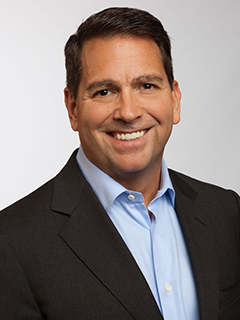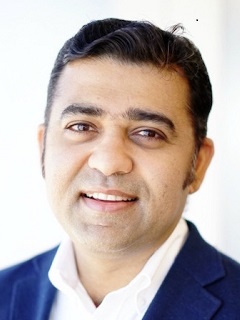Transcript
Host: All throughout this season of Speed to Modern Tech, we've been exploring some of the biggest problems businesses are facing and how technology is being used to help solve them. From the explosion of counterfeit product listings, to overhauling clunky customer call centers, the common thread through all these stories is an exponential rate of change.
Today, we're revisiting these business challenges by considering how they will evolve and the future technologies that will solve them.
I’m your host, Tori Weldon. And I sat down with three leading thinkers from KPMG who oversaw the projects featured in this podcast: Todd Lohr, the head of technology enablement. Cliff Justice, the principle of innovation and enterprise solutions. And Swami Chandrasekaran, the head of digital solutions architecture. And I started with our very first episode on the online shopping boom and the corresponding growth in counterfeit products:
David Lipkus: The truth is, anything and everything is counterfeited.
Aaron Muderik: If you're a one-person doll maker in Illinois, and you’re a $20 billion toy company, you have the same problem.
Kelly Combs: There can be thousands of products and thousands and different sellers. So half of the problem is getting the right data.
Host: In this episode, we heard how easy it's become for counterfeiters to set up and sell online. And how technologists at KPMG are using AI to build systems to flag counterfeit product listings. But we also heard this prediction from David Lipkus, a lawyer specializing in counterfeiting:
David Lipkus: How can we say that it's not going to be a growing problem? We're entering Web 3.0, now there's going to be virtual counterfeits. And so how can the volume get smaller when technology's adapting and it's getting easier to sell these goods?
Host: Todd, let's start with you. We know that brick and mortar businesses are fighting counterfeits today. So what will they face in years ahead, as the metaverse becomes more mainstream?
Todd Lohr: I think what's interesting here is you're going to see a period of time where there's an overlap of activities – whether it's purchasing goods, or supply chains – that are going to have twins in both kind of the physical world, and the virtual world. And there are things that the virtual world can do as far as providing trust to securitizing transactions into the physical world. And I think where organizations will, you know, really be challenged in their thinking is how do they work in both of those worlds? So predominantly we worked in, you know, quote unquote, that physical world and introduced the metaverse. It's not about jumping your entire business into transactions there.
It's about, how are you going to manage the transactions in both of those worlds over time. There's a lot of value that can be had in providing security and trust around things that happened in the physical world that are more traceable and secure because of what the technology allows.
Host: Swami, Cliff, what are your thoughts about this convergence of the physical and virtual worlds?
Swami Chandrashakaren: Now Web 3.0, it's an immersive and entrusted internet. And there are concepts, like non fungible tokens and NFTs. Those potentially could be used as the basis to detect or avoid for counterfeiting in the supply chains. So NFTs could be generated for every physical product that is shipped out there. So as a consumer when I'm buying a product, I can go and verify that NFT token with the manufacturer. And it's one very straightforward, simple way to use the technology to kind of overcome counterfeiting.
Cliff Justice: And you're seeing some of the early examples in the high-end luxury brands. Some of those brands are actually connecting the NFTs that are generated in the metaverse to the physical item, which makes a connection that is very difficult for a counterfeiter to copy. So if you have the NFT and you have the physical item, you know you have a higher level of assurance that that is the real product.
Host: Yeah, that’s a great example of how protecting against counterfeits could change in the metaverse. So Cliff and Swami, for traditional brick and mortar retailers -- how else will the metaverse impact them?
Cliff Justice: This is a huge transformation. If you think about the internet in 1992 where you had these walled gardens of America Online and Prodigy, that's sort of where we are right now with this metaverse. It's largely closed, and it's in the gaming sector. But there is massive investment just like there was in ’92 with the World Wide Web. There's massive investment to extend this out to the global economy.
Swami Chandrashakaren: Star Wars started this concept of holograms right? I see the whole metaverse is trying to take that concept but doing it in a different way – whether you're buying a new product, you're talking to your doctor, or you're at work and collaborating with others you're getting into a different immersive experience but able to do more productive things. And that's going to be the next transformation that's going to happen.
Cliff Justice: My 14 year old totally understands how the world that they live in in Fortnite and Roadblocks and games like that, will just be a natural way of interacting with their friends. It's just obvious to that generation how you would extend this world that they've been living in in play, into commerce.
Host: So if we all agree that the metaverse will foster a huge shift for businesses, I want to delve a little further into what communication and customer service will look like in this future – particularly customer call centers.
Wes Hawkins: And you can get disconnected and then you have to dial again and start back where you were or wait on hold.
Caitlin Donovan: Our case managers on average, take 22 phone calls to resolve a case.
Carl Marelli: A lot of the work that was done was to understand why people called into the contact center today.
Host: You've all talked about the different ways in which young people interact with technology and, and their comfort in interacting virtually. But as we learned in episode three, conversational AI is really key to this progression – particularly in customer service industries.
Here's how one of your colleagues, Arthur Franke, explained its importance:
Arthur Franke: I'm very optimistic about this technology. I look at folks like my niece who's in first grade. She's never known a world where she could not talk to her computer or her phone and get a response from an automated system. I think it's going to become table stakes for any company, any organization who has customers –– whether internal or external –– who are asking for information and need to be able to get that information wherever, whenever they are.
Host: So Swami, what do you think? Do you agree with Arthur Franke? Will conversational AI be table stakes?
Swami Chandrashakaren: Absolutely. My daughter, she's 17. Now when she was 12, she came to me and asked “Daddy, what is a voicemail? How do I leave one?” So that's how that generation is. They're not going to pick up a phone and call a 1-800 number. They want instant gratification if I could use that word.
Todd Lohr: Yeah, I would agree as well. The way I think about it, as technologists, we often talk about user experience or, you know, employee experience, client experience, customer experience, and interfaces. Right? So how you interact with technology. It so happens that voice is the most human of those experiences and interactions.
And I think that's what you're going to see in the next several years, is more and more. You're seeing it today with your phone, with your devices. But I think you're going to continue to see that evolution to the point that, you know, you may not have a keyboard at some point, right. As weird as that sounds. And it's very different than what I think most of us believed or thought, as we were introduced to technology over the last 20 years.
Host: So how will businesses need to approach customer communication in the future?
Todd Lohr: Part of the challenge – and this has been talked about quite a bit – is for one of the first times in history, you're getting five generations that have very different expectations for experiences: physical goods, services, you name the industry.
And I think that's creating more and more challenges. Right? So picking on just an industry that has a call center, which most consumer-facing organizations still have. You know, to me, a call center is the worst thing ever. Right? I can't imagine calling an 800 number and like needing to talk to someone. So, if I don't have a digital interface then I’ve failed. My children probably would expect a voice interface, or an Alexa skill to help. My parents absolutely would expect a call center, or better yet someone in person that they can drive to, to go visit right?
Now with that, the pandemic has certainly shifted that as well. But I think part of the challenge businesses are going to face and continue to face is the multimodal impact of expectations of all of the different folks and how they want to experience each company, each supply chain, customer service et cetera.
Host: So far, we've focused on the benefits of technology – how it will make consumer interactions simpler in the future. But I think we should also talk about the risks. Like what we've seen in the past few years with AI, for example:
Crystal Marie Daniels: He's like, “We have an issue. And is there someone that could co-sign the house for you?” And they didn't say there was an algorithm. They just said, “this is not going to get approved.”
Swami Chandrasekaran: In essence, what we tried to get to is how do I create a framework that has all of these checks and balances that we can put in place?
Host: Take episode four of the podcast. We heard the story of a young family who almost lost their home because software rejected their pre-approved mortgage. And in recent years, more and more companies have been paying out legal settlements related to AI algorithms. People are realizing they need better governance.
Let’s talk about some of the questions businesses need to be asking about AI. Here’s your colleague, Kelly Combs:
Kelly Combs: We reproduced or re-performed the work that the data scientists did and said, you know, we're seeing risk, for example, in these specific areas.
So, do you really understand how you're using the data and how the model used those attributes? And if a consumer was aware of that, would you have a good explanation for why that data was needed for the purposes of evaluating credit risk? So through a series of, I would say re-performing or replicating the data science activities, we’re able to uncover things like bias.
Host: So Todd, how big of an issue do you see responsible AI becoming for businesses?
Todd Lohr: Years ago, AI in most organizations was more proof of concept. It was kind of driven as experimentation. Kind of what if, what does the future look like? I think in the last several years, we've gotten to the point where organizations are implementing systems that underpin on AI and data science, and that they're not even calling it that, right? It's becoming much more mainstream. And as such, I think we need to continue to stay out in front of having the conversations of much like humans that make decisions, can impart bias, the technology can do the same. And the challenge is it's at a much different scale.
I guess my concern today is I think organizations are implementing technologies that they're probably not fully understanding kind of the implications and ramifications of those technologies.
Host: So, Swami - I want to hear your take on this too. Because you've championed KPMGs responsible AI program. What do you think?
Swami Chandrashakaren: So I've been working on this for a very long time, and I very strongly believe responsibly AI practices have to be imparted in the ways of working on a daily basis.
Like for example, when you run a factory, there are different safety measures you put in place. It's not one thing, right. Very similarly in my AI life cycle, my AI development life cycle, I got to put these different checks and balances all the way from the beginning – ensuring why are we building this AI, where is the data coming from, has the data been vetted out, does it have bias imbalance? Then, who's training the model? Do the people know are they proxying the data to different things? And then evaluating the model quality then explainability and drift…
So there's a whole life cycle of things that need to be put in place. And I don't think there is any other option. Because regulations are coming, consumers they're asking, “Why are you rejecting my loan?” for example. And counterfactuals, “What should have happened for the loan to have been approved?” It's a very natural human tendency to ask those counterfactual things. So these are becoming normal and there is no shying away for enterprises to not do these things.
Host: So looking back over this first season, one of the final themes in this series was the growing expectation for this frictionless experience. Can you give me some examples of how different technologies will start connecting with each other in the future?
Cliff Justice: I think the metaverse is a great example of the convergence of artificial intelligence, and blockchain, and cloud computing, and pretty much everything that we're talking about today. That all converges into this new way of interacting and this next generation of the internet. And if you think about just the size and scale of what we're talking about with the metaverse, you would be discussing an impact to a third of the global economy – about a $30 trillion impact over the long-term, let’s say the next 20 years. And so the world is just becoming a hybrid physical digital world. You won't be able to separate physical office space or concerts or shopping from the digital world. It is all converging and coming together.
Todd Lohr: That's a good point, Cliff. I watched my first concert in the metaverse a couple of weeks ago. And, and it was just, it was interesting. I mean, part of it was I felt just like you were watching a video playback, but the fact that I could look left and right, and then see other people like dancing and moving and nodding their head, while I'm sitting in my living room, I got that experience of being able to interact with other people and experience the energy of what you would normally get in a concert.
So it was interesting. And I think it was that mix of reality, that was just fascinating on what the future of entertainment looks.
Host: And Swami? What do you think?
Swami Chandrashakaren: I think there are several disparate advancements that are out there. I think the challenge is how do you bring them together, which is what we are working on on a daily basis with our clients. I believe it's going to come down to moments that matter, if you are an employee or a customer or consumer. So what are these moments that matter? I'm buying a product, I'm talking to my doctor, I need to consult with an expert, I need to get my job done at work. So for all these moments that matter, you're going to have a different type of technology experience.
But there are five design tenets I think that's going to kind of decide how these technologies would come together. One is a very personalized experience. So if you are a person, knowing who you are ,where you are, what are you trying to do, right? So that personalized experience. Now number two is contextual. What are you trying to do, in what context are you trying to do it? Maybe you're trying to talk to a doctor, and the context meaning you have a past historical medical conditions, and knowing about that is going to be key for a good experience. Then third is having a very human-centered approach to getting things done. So Todd talked about this concert example – you're trying to get something done. Without that, everything in a way is meaningless, right? So it's a purpose of experience. And last but not least, we should not forget is having a safe and secure way of doing all of these things. So that's how I see these things coming together: pivot around moments that matter, and technology that needs to be brought together to accomplish this using those five design tenants.
Host: That was part of my conversation with Todd Lohr, Cliff Justice and Swami Chandrashakaren, all technology leaders at KPMG. I'm Tori Weldon. You've been listening to Speed to Modern Tech, an original podcast from KPMG. If you want to know more about the technologies and the people you heard about in this story, click on the link in the show notes. We'll be back shortly for another season.




